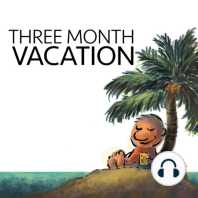16 min listen

Why The “End In Mind” Principle Can Severely Impede Our Learning and Progress
Why The “End In Mind” Principle Can Severely Impede Our Learning and Progress
ratings:
Length:
19 minutes
Released:
Aug 25, 2018
Format:
Podcast episode
Description
We're all told we should start with the end in mind, but we still get lost along the way. Why do we go off track? Could there be some barriers that show up a lot before the end? Let's find out how we can stop focusing so much on the end and work on the barriers that block our progress. Click here to read this article on the website. --------- There's something incredibly fascinating about the way chefs work. A chef doesn't tend to cook for one person. In a single night, that chef might need to go whip up anywhere between 50-200 meals. And we're not even necessarily talking about chefs you see in fancy kitchens. You can walk into any food court or even roadside food stall, and it's the same story. There's flavour, taste and texture, despite both the volume and variety of the food. It got me thinking: What makes the chef so very proficient at what she or he does? The answer, strange as it seems, is they don't tend to worry about how the dish will turn out. Instead, they seem to obsess about the preparation—the prep work—instead. Let's say you have to make an Indian dal (dal are split pulses or legumes) You're going to need onions, tomatoes, some chillies, ginger and garlic paste and about five-six spices. It's at this stage that the professional and the wannabe seem to have plans that are diametrically different. Let's take the act of chopping onions How do you chop an onion efficiently? Here's what you do: • You cut the onion from head to toe, not through the belly. • If you follow the first instruction, the peel comes off way faster than if you went through the belly. • You then hold the half of the onion, chopping methodically and evenly (but only three-fourths of the way) • Finally, you cross cut the onion, and you get chopped onion that's precise and cooks evenly. A similar amount of preparation is involved in the skill of article writing, as well A wannabe writer will look far into the future, towards how the article is written. That writer might even spend hours wondering how to start the article. But that's not what professionals tend to do. Professionals head right into the zone of prep work. They know it's the preparation—the onions, the tomatoes and the spices of the writing—that's what matters. They work on getting topics together. They then realise that topics are too broad, so they move to the sub-topic and even to the sub-sub-topic stage. When that phase is complete, they get into the act of outlining. Some scribble outlines in a matter of minutes, some colour their outlines with explicit detail. What is the wannabe writer doing at this stage? The wannabe is doing triple somersaults about what's down the road. They're eager to get past all of this nonsensical planning, outlining, topics and other blah, blah. All of this prep work is somewhat of an obstacle, and the sooner they get over it all, the more likely they are to get to the finished work. But any professional will tell you that the endpoint tends to be the most straightforward bit. All of the energy goes into the prep work. And this brings us to a critical point The prep work can be truly exhausting. Writing an outline can take anywhere between 30-60 minutes. That's on top of the time taken for the topic or sub-topic. And that's not counting the story you're going to need for the First Fifty Words. All of this prep work is truly frustrating at the best of times. Which is why the pros always focus on reducing the energy needed for the prep work. They know that if they can shave off the time taken to write a decent outline, they'll go from 60 minutes to 30, from 30 to 20, from 20 to ten—and even possibly just a few minutes. If they work on getting stunningly fast at their preparation stages, the end product takes care of itself If you want to find someone who struggles with their writing, drawing, cooking—or any skill—look at their preparatory stages. They're slow. They're inefficient. They may still turn out a great product, but it's mind-numbingly energy-d
Released:
Aug 25, 2018
Format:
Podcast episode
Titles in the series (100)
Craft Amazing Stories For Business - Part Two: Storytelling isn't an art. It's a science. Every kid knows how to tell stories. And it's cute to be a storyteller when you're a kid. But when you put structure to writing and storytelling you take it from science to art. Find out how this works with... by The Three Month Vacation Podcast